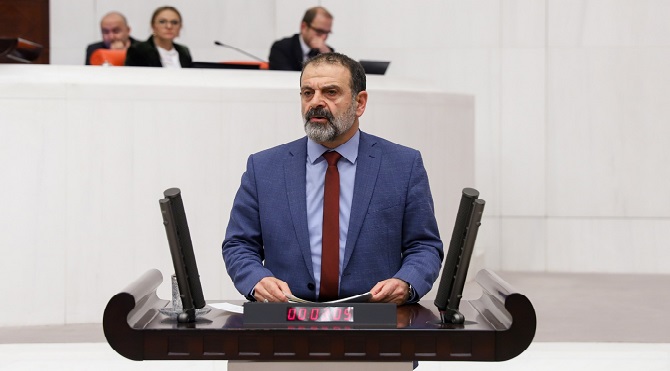Syriac Member of Turkish Parliament Çelik proposes amendments to law of citizenship
ANKARA / MARDIN, Turkey (@gazetesabro) — Syriac Turkish Member of Parliament Tuma Çelik (Peoples’ Democratic Party, HDP) has submitted to Turkish parliament a list of amendments to the law concerning Turkish citizenship. The amendments would ensure the re-admission, without constraints and in equality with current holders of citizenship, of Turkish citizenship for people forced to live in exile or people who left Turkey for political reasons.
Çelik, HDP MP for Mardin, introduced his proposal criticizing government policies of deliberate marginalization which, he argued, are far from conceptual notions of democracy and equal citizenship. Forced migration policies continue to affect and be in place today, explained Çelik: the Population Exchange of 1923, the Hakkari forced exile of 1923, the Wealth Tax of 1942, the events of 6-7 September 1955, and the events of 1964 around the Cyprus crisis.
All these, in combination with the current tense environment in Turkey, are reasons for continued forced emigration or emigration under pressure. They make citizens of different faiths and ethnic backgrounds reconsider their place in Turkey.
“Many of our Christian and Jewish citizens who were born and raised in this country had to spend their lives abroad, and many more are thinking about emigration. Turkey has witnessed numerous coups and coup attempts throughout its history. Especially the military coup of September 12, 1980 and following junta policies have negatively formed our understanding of citizenship and made our (divided) country to what it is today.”
1923 Mübadelesi, 1924 Hakkari sürgünleri, 1942 Varlık Vergisi uygulaması, 6-7 Eylül 1955, 1964’te Kıbrıs olayları ile Türkiye’de yaşayan farklı inanç ve etnik gruplardan insanlar göç etmek zorunda bırakıldılar. Tekrar vatandaşlığa kabul edilmeleri temel bir haktır. pic.twitter.com/W5VL7dd1g6
— Tuma Çelik (@tumacelikhdp) June 26, 2020
In particular Armenian, Greek, Syriac, and Jewish peoples are most exposed to policies of division and hence make up the bulk of forced emigrations. Çelik’s proposal comes in part after a series of negative public statements, hate speeches, and attacks on non-Muslim religious objects and citizens in recent months. These events have scared off many more non-Muslims inside and outside the country.
“Facing the past will improve belief in justice. Where we should have a social welfare state with associated fair policies of equality in religious and ethnic matters, we have government policies in place which create social injustice and large economic and income gaps. Many citizens left the country over this and the loss of their citizenship caused further cultural and economic losses.”
According to Çelik, confrontation with the past will improve belief in justice and will enable us to build bridges between the past and the future. Cultures on the brink of disappearing from Turkey will be revived by unconditioned re-admissions to citizenship, and this will also create economic value in many regions of Turkey.
Çelik said that like many hundreds of thousands Christians citizens in Turkey, he too was born and raised exposed to forced migration, “From the day the Republic of Turkey was established it has become a country of emigration.” He believes steps to regain confidence and assurance need to be taken.
People originally from Turkey who have no citizenship after they left the country, should be re-admitted without conditions, his proposal says.






















